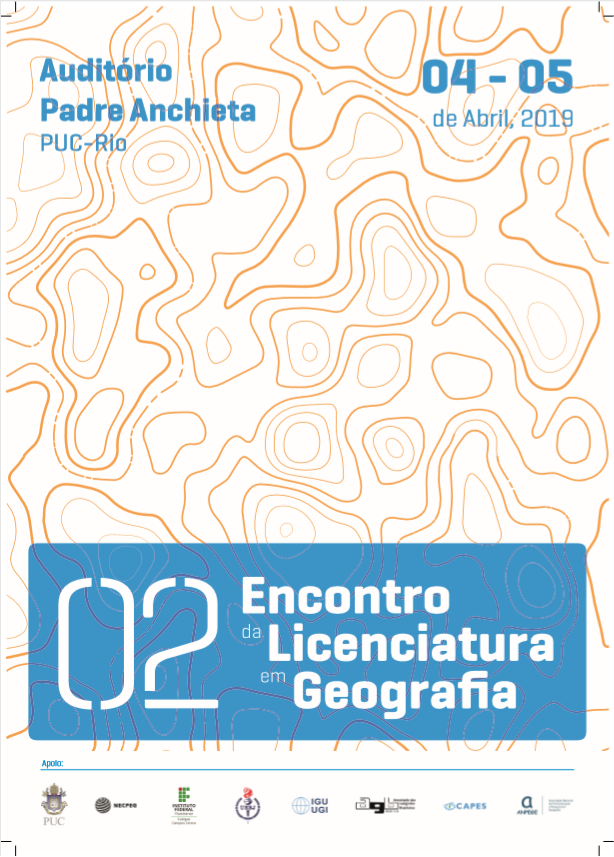Pensamento Espacial e Educação Geográfica
uma análise comparativa da demanda de pensamento espacial nos vestibulares UERJ e ENEM
Resumo
Este trabalho gravita em torno dos eixos temáticos: pensamento espacial, exames de vestibular e educação geográfica. O objetivo principal é a investigação da relevância do pensamento espacial para a resolução de questões geográficas dos vestibulares UERJ e ENEM; como objetivos secundários buscou-se a identificação da carga de pensamento espacial – utilizando como instrumento metodológico a taxonomia de Jo e Bednarz – que é cobrada nas questões geográficas dos vestibulares UERJ e ENEM em seus últimos oito anos de provas e a averiguação, através de questionários, da possibilidade de relação direta entre alta carga de pensamento espacial nas questões geográficas das provas e impressão positiva de docentes de Geografia em relação a essas mesmas. Foi utilizada neste trabalho a definição de pensamento espacial contida no documento da National Research Council – Learning To Think Spatially. Como resultados, identificou-se que o pensamento espacial é muito relevante para um bom desempenho nas questões geográficas no Vestibular UERJ e tem baixa relevância para as mesmas questões no ENEM. Isso se deve ao fato de o Vestibular UERJ possuir uma carga de pensamento espacial muito maior em relação ao ENEM no recorte temporal analisado, exigindo muito mais do candidato em sua cognição espacial. Além disso, o resultado e as análises do questionário aplicado em professores de Geografia trazem fortes indícios de que uma maior carga de pensamento espacial pode ser um dos fatores que impactam positivamente a impressão dos docentes a respeito dos exames, trazendo novas questões e abrindo novas perspectivas para pesquisas acerca do papel do pensamento espacial e das representações espaciais no ensino. Por fim, após responder aos objetivos propostos, concluiu-se que o pensamento espacial se apresenta como um arcabouço teórico e um instrumental que tem grande potencial para incentivar e enriquecer o uso de representações espaciais no processo de ensino-aprendizagem na educação geográfica.
Palavras-chave: Pensamento espacial, Vestibular, Educação geográfica, Representações espaciais
Abstract
This work is focused on the following thematic axes: spatial thinking, vestibular exams and geography education. It has as main objective the investigation of the spatial thinking impact for the resolution of geographic questions from vestibulares UERJ and ENEM; as secondary goals we look for the identification of the spatial thinking charge - using as a methodological instrument the taxonomy of Jo and Bednarz - that is charged in the geography questions of the vestibular UERJ and ENEM in its last eight years of tests, and the investigation, through questionnaires, from the possibility of a direct relation between high spatial thinking charge on the geography questions of the tests and positive impression of Geography teachers in relation to these same tests. We use, in this paper, a definition of spatial thinking contained in the document of the National Research Council - Learning to Think Spatially. As results, we have identified that spatial thinking is very relevant for a good score on geography questions from the Vestibuler UERJ and at the same time, it is not so relevant for a good score on geography questions from ENEM. It occurs because Vestibular UERJ has a charge of spatial thinking much more higher in relation to ENEM on the temporal clipping analyzed, requiring much more of the candidate in his spatial cognition. In addition, the result and the analisys from the questionnaires applied in geography teachers bring strong indications that a greater spatial thinking charge may be one of the factors that positively impact the teachers impression of the exams, bringing new questions and opening up new perspectives for research on the role of spatial thinking in teaching. Finally, after answered the proposed objectives, we conclude that spatial thinking presentes itself as a theoretical-methodological framework and an instrument that has great potential to enrich the teaching-learning process, curriculum, teacher training and methodologies in geography education as a whole.
Key words: Spatial thinking, Vestibular exams, Geography education, Spatial representations
Downloads
Publicado
Edição
Seção
Licença
Ao submeter um artigo para publicação na Revista Educação Geográfica em Foco, o autor concorda com os seguintes termos:
1. O autor mantém os direitos sobre o artigo, mas a sua publicação na revista implica, automaticamente, a cessão integral e exclusiva dos direitos autorais para a primeira edição, sem pagamento.
2. As ideias e opiniões expressas no artigo são de exclusiva responsabilidade do autor, não refletindo, necessariamente, as opiniões da EGF.
3. Após a primeira publicação, o autor tem autorização para assumir contratos adicionais, independentes da EGF, para a divulgação do trabalho por outros meios, desde que feita a citação completa da publicação original.
4. O autor de um artigo já publicado tem permissão e é estimulado a distribuir o seu trabalho on-line, sempre com as devidas citações da primeira edição.
* A EGF é um periódico de acesso aberto, concedendo, por isso, o uso gratuito dos artigos em aplicações educacionais, científicas, não comerciais, desde que citada a fonte.


